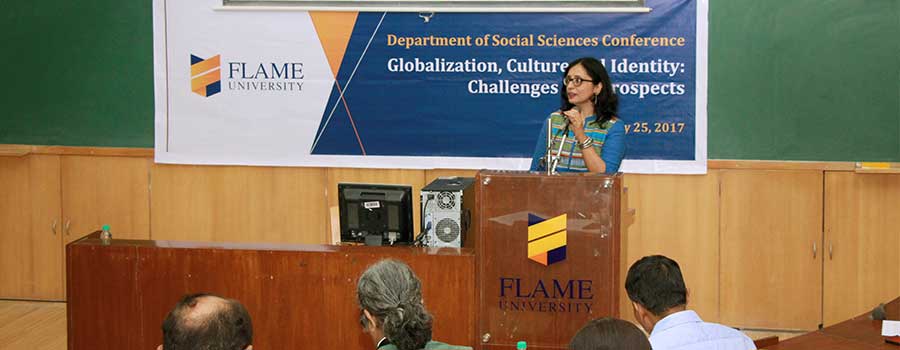The department of social sciences held a conference on Saturday 25th February, 2017.
This conference engaged with some of the prospects and challenges that lie ahead of individuals and societies to sustain in an unevenly globalizing world. The panels on Youth, Gender and Identity, Globalization and Development, and Migration and Culture addressed the following questions: Do opportunities opened up by globalization help individuals and communities break out of the rigid structures of caste and religion? What are the multiple ways in which media helps individuals question new expressions of caste, class and patriarchy? In the popular rhetoric of development, defined mostly as economic growth, what kind of future can be imagined for the poor, displaced and marginalized? The conference aimed not just to debate a critical mass of ideas but also initiate future research collaborations.
The Keynote Speech was delivered by Dr. Ashwani Kumar, Professor of Development Studies at the Center of Public Policy, Habitat and Human Development at Tata Institute of Social Sciences, Mumbai.
Prof. Kumar has previously taught at Delhi University, and University of Oklahoma. He has also been a Visiting Fellow at Centre for the Study of Global Governance, London School of Economics (London), German Development Institute (Bonn), Korea Development Institute (Seoul), and North West University (South Africa). Dr. Kumar has authored “Community Warriors: State, Peasants and Private Caste Armies in Bihar”, a significant contribution to exploring paradoxes of democracy and governance in India. Along with Dr. Mary Kaldor, Dr. Kumar has co-edited the prestigious LSE Yearbook on “Global Civil Society: Poverty and Activism”. He has also co-edited “Power Shifts and Global Governance” along with Dr. Dirk Messner (Director of German Development Institute).
In addition to his academic pursuits, Dr. Kumar is also a much acclaimed poet. He writes in English, and has recently published his anthology: “My Grandfather’s Imaginary Typewriter”. At leisure, he writes articles and reviews for Financial Express, Business Standard, The Hindu, Indian Express, Daily News and Analysis, Open Democracy, Prabhat Khabar, and Outlook (Hindi) among others.
The conference was divided into the following three sessions:
Session 1: Youth, Gender and Development
This session included interesting papers and presentations on topics such as, “Our girls, their girls”: Gendered performances of feminity from ‘Queen’ by Ravikant Kisana; Creating self on Facebook: A study on young Chennai women by B. Bharati and Ravi Kumar; Construction of self in selfie in a globalized world by Manjari Shah; Selfies and the self: A study of digital self-representation among young adults on social media by Mosam Acharya and Shubdha Arora.
Session 2: Globalization and Development
This session brought to light the effects of globalization on development around the world. It covered variety of topics like; “Not here to stay?: Chinese transnationalism and globalization in Serbia by Andres Parrado; Building smart villages with the convergence of public and private by Pray Bavishi; Bauxite mining, development and displacement: Kashipur in western Odisha by Ambuja Kumar Tripathy; Development and displacement in the tribal belts of Maharashtra: Gaps in policies and practices by Natasha Sharma.
Session 3: Migration and Culture
This session spoke about how global migration has changed the perceived notion of culture and identity. It included presentations on topics such as: Contextualizing diasporic culture and identity in an age of global migration by Divya Balan; The imagined diaspora: diaspora and nationalism in post-liberalization India by Priyanka Kaul; Bilingualism in Spain by Maria Belen; Caste in the context of globalization – a study in rural Tamil Nadu by M. Sifa Rahmania; Persistance of polygamy in India: Failure of the secular ideal by Sachin Dhawan.
The conference was concluded by a speech from the valedictory speaker Dr. Ravindra K. Jain, who is the Elected Chairman of the Indian National Confederation and Academy of Anthropologists (2008–11). He was recently Visiting Professor, Universiti Kebangsaan Malaysia, Bangi, Selangor, Malaysia and the University of KwaZulu Natal, Durban, South Africa. He taught Social Anthropology and Sociology at Oxford (1966–74) and Jawaharlal Nehru University, New Delhi (1975–2002). An international authority on Indian diaspora, Prof. Jain is on the editorial board of Global Networks and South Asian Diaspora. He has authored several books which are widely referred. His latest publication is Nation, Diaspora, Trans-Nation: Reflections from India, Routledge, 2010. In February 2011, Professor Jain was awarded the prestigious Tagore National Fellowship for Cultural Research by the Ministry of Culture, Government of India.


